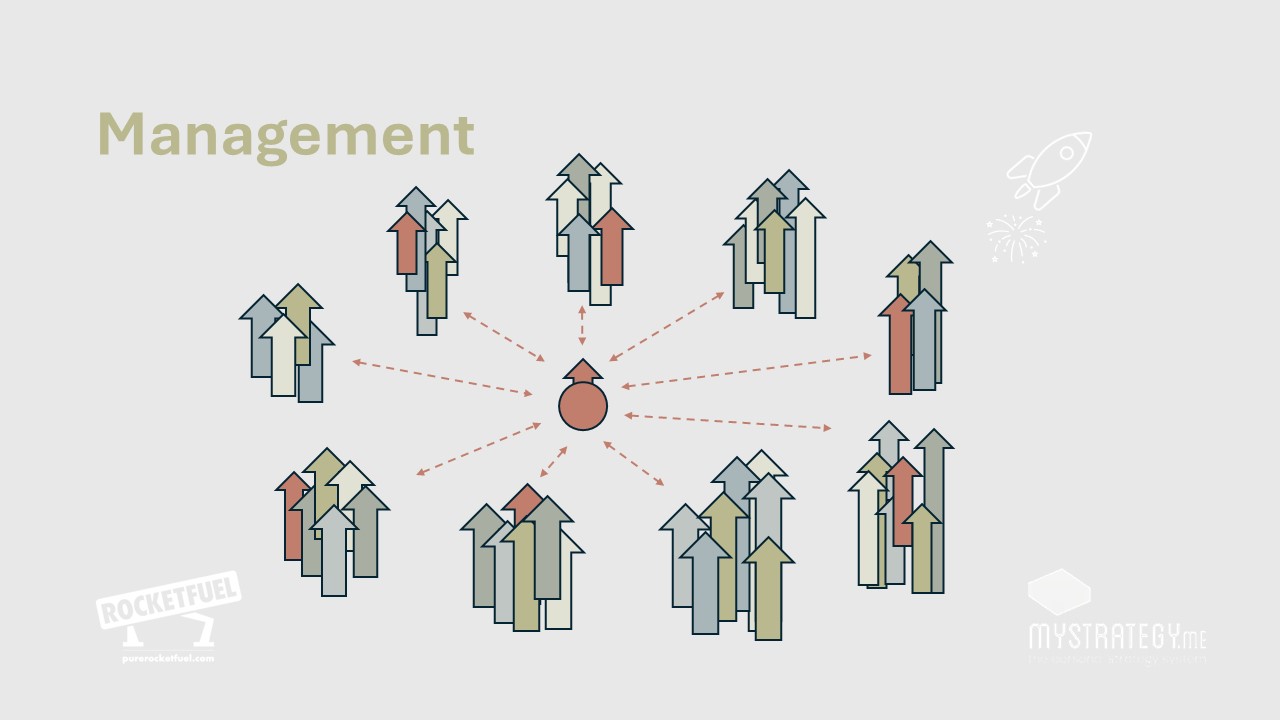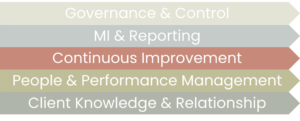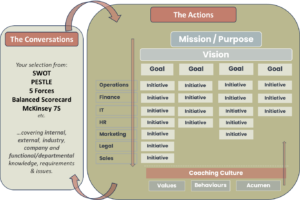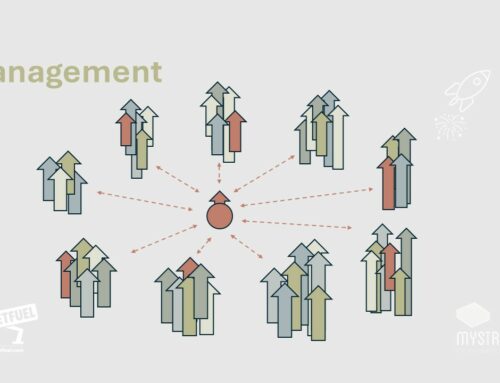
Management is the art of orchestrating chaos into harmony, reminds Leadership & Performance Coach, Davina Greene.
Ah, management – that elusive realm where chaos meets order, where strategy meets execution, and where leadership meets administration. It’s often discussed, yet frequently misunderstood. But fear not, for we’re about to embark on a short jaunt through the labyrinth.
The Management Dream
Picture this: a bustling office, phones ringing, keyboards clacking, and voices buzzing. Amidst this cacophony, the manager stands tall, a conductor amidst the symphony of productivity. But what exactly does it mean to manage?
At its core, management is about coordinating people, ensuring action, and achieving results. It’s about guiding individuals and teams towards common goals, navigating obstacles, and adapting to ever-changing circumstances. But management is more than just delegating tasks and crunching numbers; it’s about nurturing talent, fostering innovation, and cultivating a culture of excellence. It’s about continuous improvement, continuous small changes, that consistently dial up performance levels to achieve better and better results for individuals and for organizations. Do this, and you may be displaying to move towards the next level: the one they call leadership.
Management Myths
Now, let’s debunk some myths about management, shall we? First off, the notion that managers are omnipotent beings with all the answers is as fanciful as unicorns prancing through the office corridors. In reality, managers are mere mortals grappling with uncertainty, ambiguity, and the occasional office politics.
Furthermore, the idea that management is a solitary pursuit is about as accurate as a weather forecast in a snow globe. Effective management is a collaborative endeavor, requiring open communication, trust, and teamwork. It’s about building bridges, not burning them; fostering camaraderie, not competition.
What else? The notion that Management is a true ‘specialism’; rather, it’s more of a generalist endeavor. Think that the Wellness function over there and the Learning function over there are your escape from those tasks? Think again! Management requires your activity or, at least, support for all relevant topics (my standard symbol for this on presentations etc. is a drum – you need to keep banging on it, on every topic, to ensure it is understood and taken seriously. Even if HR or L&D did the initial teaching, you need to manage concepts into place). And, don’t forget, no matter what Wellness initiatives are in place, a poor relationship between you, as manager, and your direct reports is the only thing that will matter in their world – whether that situation ends in resignation or a medical or legal situation.
But perhaps the greatest misconception about management is that it’s a one-size-fits-all endeavor. Nothing could be further from the truth. Just as every snowflake (in every sense) is unique, so too are the challenges and opportunities that managers face. Whether you’re managing a team of software developers, wrangling a herd of marketing mavens, or steering the ship of a multinational corporation, one thing remains constant: the need for adaptability. We think about managers as people who create and handle processes, often forgetting that corralling a wide variety of human behaviors is really the only way to reliably achieve this.
Excelling at Management
So, what does it take to be a great manager?
Practical Management Skill
Well, it starts with having a basic command across multiple areas that require, most likely, different aspects of your personality and arsenal of behaviors (and some of which you’ll enjoy more than others because of that).

5 Core Management Responsibility Areas
- Governance & Control is, to me, the very core of Management: you’re supposed to have things under control, to be answerable for yourself and your team/business. This would therefore include creation and maintenance of Processes & Procedures and whether regular audits are happening to make sure we are following our own processes (or any legal or regulatory obligations) across all topics, etc. This is important for internal efficiency, Knowledge Management and Succession Management, too, as well as to ensure any external audits are successful. We fail here when information is in people’s heads, when our teaching/hand-over is entirely verbal, or when we don’t check Procedures are actually happening (“It’s not my fault, I told my team about that 6 months ago” being an entirely unacceptable managerial response in most instances). Failures here can, of course, have legal consequences, depending on the point of error.
- MI & Reporting is the observation of whether we’re measuring everything we should be measuring, whether we’re acting on that data. This includes knowing whether any new/improved reports are needed (or any can stop, to save time), whether everyone who needs to be informed is being informed, etc. You can see how this can tie to the above Governance & Control point: how easy can you make your management of a situation by designing yourself great reports?
- Continuous Improvement is everything to do with Idea generation, debate and logging (small, medium or large; urgent or otherwise), and the actioning of those ideas via sensible management of a Project list. The best managers will also remember that any improvements in their area are key ‘sales’ points for selling the greatness of their team during the next Management meeting.
- People & Performance Management: This is the ability of managers to largely manage and develop their own people with minimal referral to HR or L&D, from the happy “engagement” piece through embedding an active “Coaching Culture” to the less-happy “disciplinary” piece, for maximum accountability and efficiency. Where managers are great, HR, L&D etc. become ‘advisory’ functions, happily giving new information and support as required. Where managers are less-than-great, HR and L&D become over-worked functions, stepping in constantly and endlessly repeating the same advice and instructions. As your colleagues, they play a role in creating your reputation as a Manager: think long and hard before making them do your job for you.
- Client View & Relationship: Depending on what kind of organization you’re in, this would include monitoring whether any deep understanding of the client(s) is there; whether the ability to manage and predict the client is developing for each manager and team member; whether client-related knowledge is being documented and passed from generation to generation of staff so that we’re not making the client repeat themselves, etc.
Things like your Talent Management, Knowledge Management and Succession Management processes would therefore touch on multiple of these areas. Your perspective and prowess as a Manager would then also include how good you are at knowing when you can, or should, refer to other teams such as Finance, HR, L&D, or Compliance as you carry out the above day-to-day managerial tasks.
These are the types of headings that would usually be discussed at Management Meetings, and if all are covered, this generally adds up to a strong managerial role/experience. Contrary to popular belief, Management actually starts with a healthy dose of humility. Learners are allowed to be learners; even great managers understand that they don’t have all the answers and are willing to seek input from those around them. So, if some of the terms and concepts above are mystifying to you, don’t panic. Just seek to embed yourself further into these key areas now. Master these and your Management skills become truly transferrable from business to business, industry to industry.
Strategic Management Skill
Building on the above skills, great managers must also possess an ability to work towards a Vision as defined by the organizational strategy (diagram below), with a clear sense of purpose and direction that inspires others to follow. They’re like navigators guiding a ship through stormy seas, charting a course towards calmer waters. The vision may be their own or someone else’s, but a great manager understands that all actions must be pointed in that particular direction.

Rocket Fuel Learning’s “Organizational Strategy Overview” Model
Behavioral Management Skill
Of course, no discussion of management would be complete without addressing the dreaded “micromanager” – that perennial thorn in the side of every self-respecting employee. Micromanagers are like helicopter parents hovering over their children’s every move. They suffocate creativity, stifle autonomy, and drive their teams to the brink of insanity. The antidote? Embed a sense of responsibility to improve trust, leading by example through robust demonstration of same on your part. Trust your team to do their jobs, empower them to make decisions, and watch them soar.
But let’s not forget about the importance of humanity in management. Great managers understand that their team members are not cogs in a machine but human beings with hopes, fears, and aspirations. They take the time to listen, to understand, and to support their team members through both the triumphs and tribulations of life.
And let’s not overlook the importance of resilience in management. Great managers understand that failure is not the end but rather a stepping stone on the path to success. They bounce back from setbacks, learn from their mistakes, and emerge stronger and wiser than before. They’re not afraid to roll up their sleeves and get their hands dirty when the situation calls for it.
Communication, of course, is vital. You are responsible for dealing with people, and for conveying messages on behalf of the organization – a manager cannot hide.
Finally, perspective: As manager, people are looking to you for context, understanding, and to gauge what their level of concern needs to be at any given moment. Your acumen and your level of maturity, as a human and as a manager, will dictate how people perceive your sense of perspective and therefore react to you. As a key member of the organizational “crew”, to avoid steering your team off-course, you must be astute in understanding your environment, your surroundings, your business, and your team.
If, in the corporate world, Management is generally a precursor of Leadership, then Self-Knowledge must begin at this point. The 5 trait categories referenced above illustrate key traits for any human being in their interactions with other people, and indeed with the world around them – and each of those 5 categories contains a further multitude of behaviors within.
Monitor and improve yourself in respect of those, and you can’t go too far wrong.

Rocket Fuel Learning’s “5 Core Trait Categories”
In the ever-evolving landscape of management, adaptability across all of the above is key, dialing traits up and down depending on the person or situation involved. Great managers are like chameleons, able to adjust their approach to fit the needs of the situation. They’re not wedded to a single management style but rather draw upon a diverse toolkit of strategies and techniques.
More than anything, view it as a generalist task – the more you aim to minimize a Management role, the less learning, satisfaction, and credibility for you, and the narrower the employee experience below you potentially becomes. Who wants to look at their manager and think, “Really?! What’s the difference between that job and this one?”. That’s unhelpful for everyone, especially if it’s becoming an organizational trend.
Management In Summary
Management is a multifaceted endeavor that requires a delicate balance of practical skills alongside personal traits and behaviors.
It’s a journey fraught with challenges and opportunities, twists and turns, but for those brave enough to embark upon it fully, the rewards are boundless. So, to all the aspiring managers out there: embrace the chaos, inspire the harmony, and lead with courage and compassion.
Interested in investing in your own personal – and personal strategy – development? Check out www.MyStrategy.me!
Share This!
About the Author



